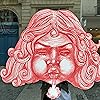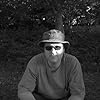To answer questions about
Station Eleven,
please sign up.
Dead John Williams
I know this is late but I have just finished Station Eleven and I am intrigued by your question because of what it assumes.
You have to feed yourself every day. Without the modern world how you go about that? You have no refrigeration so you have to gather food regularly. How will you maintain your energy intake? If you fail to feed yourself for 3 days in a row but have used energy trying you will be feeling physically drained and your thinking may not be altogether rational. Your failing physical resources make it more likely that you will fail to feed yourself again. If you haven't eaten in 7 days you will be so weak that you will probably not be able to gather food again. Grass and bark will not keep you alive.
Whilst all this is going on you will need to protect yourself, not get injured or wounded or otherwise infected. You will need to source clean water, one bout of dysentery and it is pretty much all over for you (or any of us).
Assuming that you manage to do all this and find a library and have time to read, would you have the skills to make or assemble the relevant parts? Would you know where to find the relevant parts? No power tools. Would you evaluate the risk of spending time reading when you cannot guarantee and food supply or even your own safety?
I am very skilled in the technical areas required for solar or other energry sources but could I feed myself? I'm not sure that I could. Could I find someone to feed me while I produce electricity? or even anyone who saw the use of that? What would you do with electricity that would be worth the effort and risk?
Just my thoughts and thanks for sparking such a good thread
You have to feed yourself every day. Without the modern world how you go about that? You have no refrigeration so you have to gather food regularly. How will you maintain your energy intake? If you fail to feed yourself for 3 days in a row but have used energy trying you will be feeling physically drained and your thinking may not be altogether rational. Your failing physical resources make it more likely that you will fail to feed yourself again. If you haven't eaten in 7 days you will be so weak that you will probably not be able to gather food again. Grass and bark will not keep you alive.
Whilst all this is going on you will need to protect yourself, not get injured or wounded or otherwise infected. You will need to source clean water, one bout of dysentery and it is pretty much all over for you (or any of us).
Assuming that you manage to do all this and find a library and have time to read, would you have the skills to make or assemble the relevant parts? Would you know where to find the relevant parts? No power tools. Would you evaluate the risk of spending time reading when you cannot guarantee and food supply or even your own safety?
I am very skilled in the technical areas required for solar or other energry sources but could I feed myself? I'm not sure that I could. Could I find someone to feed me while I produce electricity? or even anyone who saw the use of that? What would you do with electricity that would be worth the effort and risk?
Just my thoughts and thanks for sparking such a good thread
Zvika
This answer contains spoilers…
(view spoiler)
Julie
We don't know that someone didn't do as you suggest. Perhaps someone four hundred miles away did. Maybe things are completely different in other places beyond the reach of the remaining communications technology. We're only seeing a tiny slice of the world, which is all that our characters can have in view. (I think this uncertainty is part of the point.).
I also think (being an optimist) that what you describe will happen with increasing frequency as the world moves forward. You can see, by the end of the novel, that it is starting to happen. It just takes time. Perhaps the author is making things move too slowly, or maybe you're thinking things would move faster than is likely. I suppose we don't really know and, with luck, we never will.
I also think (being an optimist) that what you describe will happen with increasing frequency as the world moves forward. You can see, by the end of the novel, that it is starting to happen. It just takes time. Perhaps the author is making things move too slowly, or maybe you're thinking things would move faster than is likely. I suppose we don't really know and, with luck, we never will.
Jacob Springer
This answer contains spoilers…
(view spoiler)
Andrea
As an engineer I find this an insurmountable issue with the plot. Apparently ALL the engineers were killed by the virus, since I can guaren-damn-tee you that I would not be living like this 20 years out, not even 5 years out. Fact.
Imola Ilyes
In contrast to some people who answered this question, I didn't find this part of the book to be that unrealistic. I think people might underestimate not only the physical but the social infrastructure that needs to be in place for technology and medicine to get back up and running. Most electricity production is still tied to the electrical grid - I've never encountered a wind-up radio or a house powered off the grid, though these do exist. That means that post-collapse someone would either have to find these things or make them from scratch. While books and raw materials are indeed present, travel is dangerous, as is owning things. It was mentioned in passing that one of the characters was beaten up and had her bicycle stolen. Most books are also in cities and larger towns, which were abandoned in the immediate aftermath and back to which people would have to travel - which again, is dangerous. And in order to be inventive, you generally need security, as well as cooperation from others. There are no lone inventors - even those who work alone depend on the non-interference and frequently the cooperation of others, to provide raw materials, food, security, etc.
In a broader historical time-scale, 20 years isn't even that long anyways. The early Middle Ages, which saw the retreat of the Roman army, the decline of trade and the shrinkage of cities, lasted hundreds of years. So in the grander scale of things, it isn't even that long for things to get up and going again.
In a broader historical time-scale, 20 years isn't even that long anyways. The early Middle Ages, which saw the retreat of the Roman army, the decline of trade and the shrinkage of cities, lasted hundreds of years. So in the grander scale of things, it isn't even that long for things to get up and going again.
Tracy Clair
I thought that was the point of the the last few pages, when someone had managed to set up electricity for an entire town. There were so many other things that had to be done before people could even think about rebuilding, such as safety and survival. It's kind of like starting all over, if you think about how far we've come since the beginning of time.
That was also the point of the discussion, do we teach our kids about the way things used to be, and I think that the answer is yes. Without everyone knowing how things used to be, we can't become a better society.
That was also the point of the discussion, do we teach our kids about the way things used to be, and I think that the answer is yes. Without everyone knowing how things used to be, we can't become a better society.
Haris
I realize this was asked 3 years ago but I'm bored so I'll answer: our civilization requires A LOT of people to work. You could hand me all the books about how to build a car, and I could maybe do 1% of it. The reason we have the life we have today is that billions of people do small parts and it adds up. A famous essay by Leonard Read, "I, Pencil" tells us that no person on Earth knows how to make a pencil, but millions of people mine graphite, chop wood, create paint, and rubber, and iron, so that ultimately we end up with a pencil. Our technology requires even more people to function, even with all the knowledge there, in writing.
Francene Carroll
For a novel which is allegedly about the role of art in society there was very little about books in Station Eleven and no logical explanation for this omission that I can remember. You'd think that in the absence of television and computers that reading would become an important pastime and with only 1% of the population left it's not like that have any shortage of things to read.
Lynne
Wasn't there any solar power still working afterwards?
Jeannie
I asked the same question. What about the libraries? At first I was thinking that the virus must have wiped out anyone with any intellect whatsoever. In the end, I realized this book is more a theoretical exploration of human interaction rather than a survivalist manual for doomsday prepping. It is not meant to be taken literally, or even fully believed. The reader experiences the suspension of disbelief that endures through the novel just as the world of "Station Eleven" isn't literal but is a beautiful artistic interpretation borrowed from snippets of reality and what ifs.
Lori Sue
I wondered about this also... Since we're not told what happened in year 5, 10, etc. Maybe all of the major cities, libraries included, were reduced to ash, as is imagined and mentioned more than once in the story. The author was telling this story, consumed with this particular group of loosely connected 'nomads.' The author wasn't presenting a comprehensive historical documentary on life after the collapse. Im guessing there would have been thousands of groups...haphazardly thrown together, all with varying skills, education, reactions, etc.
At the end of the book, when Clark shows Kirsten the amazing development he has discovered while looking through the telescope, we see a glimpse of what another group of nomads has created with their particular focus, and apparent skills and interests... that bit wrapped it up for me, that we were shown an experience of a small group of people -- less than a couple hundred -- within a few hundred square miles, walking distance of one one another... a very tiny closeup of the aftermath of a global event. (The amazing discovery, viewed through the telescope, left me surprised, however, at how LONG it took!) This, to me, underscores our dependence on established technology. Makes me think of the explorers, inventors and dreamers who furthered society over the centuries, building on each others' lifetimes of effort and discovery. One of the characters muses about this... noting the difference in shakespeare's experience of surviving the plague: In the 1500's, shakespeare's time, they didn't lose the collected, enormity of the way of life which had been established over centuries, at the time of the collapse in 2013.
At the end of the book, when Clark shows Kirsten the amazing development he has discovered while looking through the telescope, we see a glimpse of what another group of nomads has created with their particular focus, and apparent skills and interests... that bit wrapped it up for me, that we were shown an experience of a small group of people -- less than a couple hundred -- within a few hundred square miles, walking distance of one one another... a very tiny closeup of the aftermath of a global event. (The amazing discovery, viewed through the telescope, left me surprised, however, at how LONG it took!) This, to me, underscores our dependence on established technology. Makes me think of the explorers, inventors and dreamers who furthered society over the centuries, building on each others' lifetimes of effort and discovery. One of the characters muses about this... noting the difference in shakespeare's experience of surviving the plague: In the 1500's, shakespeare's time, they didn't lose the collected, enormity of the way of life which had been established over centuries, at the time of the collapse in 2013.
Clare
One thing I really liked about this book was that it really made you think about how much civilization runs on *labor*, not autonomous self-sustaining tech, that no matter how much of that labor is hidden and alienated, it's still there and it's still what makes everything go, and then I read this thread and I guess there's really no such thing as *making* people think about something after all.
It requires human labor to run a library. Otherwise it either gets mildewy or catches on fire. There are bonus book-damaging possibilities if the library's full of human corpses.
It requires human labor to run a library. Otherwise it either gets mildewy or catches on fire. There are bonus book-damaging possibilities if the library's full of human corpses.
Melinda Worfolk
This answer contains spoilers…
(view spoiler)
Henry
I had no problem with this. If Toronto was deserted, that's 3 million people down to maybe 100. Not enough to run any kind of infrastructure. For more background look into how African towns and villages have trouble with N.American exported technology. They need small locally sustainable solutions. This is a theme of E.F. Schumacher's 'Small is Beautiful'.
Brad Gall
The information is there but there is no infrastructure, and no human capital. 20 years in and the population at the airport is only about ~300 people and that's considered a large settlement. They are most likely more concerned about making it through the next winter.
As far as technology yes making electricity is easy, storing it is hard. There is no going to the Wal-Mart and picking up a 12v car battery you have to make it from scratch.
As far as technology yes making electricity is easy, storing it is hard. There is no going to the Wal-Mart and picking up a 12v car battery you have to make it from scratch.
David Homer
Hmmm I'm in two minds about this, given that 99% of the population are dead that means there's enough stuff in storage for 100 times more people. I personally would have biked to an Amazon distribution center or Argos and found some solar panels, wind up torches and some antibiotics (they'd last a couple of years).
But then I guess the book is not really about the practicalities of survivalism. Also after spending a year in an airport wondering if you leave you'll contract a deadly virus and die maybe you wouldn't be out there trying to restore society, you'd be happy reading the trashy novels from the departure lounge and trying to grow vegetables.
But then I guess the book is not really about the practicalities of survivalism. Also after spending a year in an airport wondering if you leave you'll contract a deadly virus and die maybe you wouldn't be out there trying to restore society, you'd be happy reading the trashy novels from the departure lounge and trying to grow vegetables.
Dave
Yeah that bothered me as well. I know that the flu wiped out 99 percent of the population but I can't believe that the entire population was devoid of someone who had the knowledge to get the electricity going again before 20 years had passed. Or someone with the curiosity to look into the knowledge of it.
Brooke
This answer contains spoilers…
(view spoiler)
Amy
That was exactly my thought through the entire book. It was a pandemic not a meteorite or some other cataclysmic event. The energy grids, satellites, bundling material, etc would have been available. I could understand waiting a year or so before venturing out to be sure the virus had died off, but 20 years seemed completely unbelievable.
Sheila Noftall
This answer contains spoilers…
(view spoiler)
Chris Donnell
We read this as part of a Sci-Fi book club, so many of us had this problem with it. I phrased it as the 'Home Depot' problem, where I couldn't quite figure out why everyone didn't just ransack the nearest Home Depot. This was certainly the biggest area where I couldn't just suspend disbelief over what was (or wasn't) happening. I could see maybe taking 20 days to get your bearings, but 20 years is a bit much.
Luke
I forget where I read this, but I read an essay that talked about how the easy and relatively easy sources of coal and Iron have already been largely depleted; and it does take increasingly advanced tech to maintain supplies of these basic building blocks. Coal production now is often entire mountain destruction to get at the deep remaining veins, something that no post apocalyptic society would be able to manage for a very long time. Forests would come back, but the energy produced from wood is too little to support even mid level steam technology. Better to hold our society together than long for a reboot/redo!
Katy Berman
I think that the people who remained were so few and most of them in survival mode, that it was difficult to trust anyone. People were traveling around and happened upon places, it seems, by chance (such as hotels, restaurants, etc.), where they can find something useful. The Symphony, I think, represents the desire to continue a cultural tradition. But a library can only go so far to teach someone how to rebuild. If you are alone, there isn't much you could do. In a group, there are people with a variety of skills and abilities, and the novel shows how these were put to use. At the end, a settlement is sighted that has developed electricity again. There must have been some scientists and technicians in the group that settled there. Perhaps they had a library also.
Erica
This answer contains spoilers…
(view spoiler)
Richard Smith
So many shake your head moments in this book.
Did no electrical engineers survive? Pilots? Builders? Solar panels? Why the heck did these people choose to tough it out in Michigan of all places (very little discussion of how they survived the winters)? What's the attraction to airports?
Ridiculous
Did no electrical engineers survive? Pilots? Builders? Solar panels? Why the heck did these people choose to tough it out in Michigan of all places (very little discussion of how they survived the winters)? What's the attraction to airports?
Ridiculous
Danielle
This answer contains spoilers…
(view spoiler)
Wyma
Yes, this was my biggest question. There must have been electricians and engineers and back to the land people who could figure out a way to have electricity on a small scale. Not starting up the grid, but one would think they would run across small rural farms with electricity and well water.
Kellie
I thought about this too. Like others have said, the early days of the pandemic seem to be fraught with uncertainty and chaos. People died so quickly, yet those who survived clung to a hope that "someone will save us" and then everything will return to normal. In that moment, all you can think about is the short-term and how to survive the next day.
I also think that many of the characters suffer from some degree of PTSD, which could also impact their ability to plan and think rationally.
I also think that many of the characters suffer from some degree of PTSD, which could also impact their ability to plan and think rationally.
Ufuk Cetincan
99% (and a change) percent of the population dies. so roughly 99% of the doctors, engineers and bakers and quakers are gone... Also, the book takes place in a land that's only a couple of hundred miles radius, and far away from major cities. Surely that question bothered me too, but it's not totally unbelievable...
Also taking up from there, if there are any surgeons left, the second generation will not have any due to lack of proper education and practice. How can you cut open a patient only by reading books?...
Also taking up from there, if there are any surgeons left, the second generation will not have any due to lack of proper education and practice. How can you cut open a patient only by reading books?...
Fred Svoboda
Yes, I mentioned something similar in my review. However, the post-apocalyptic genre requires breakdown of society, technology no longer being employed, etc., etc. It is making a certain predetermined point, but really isn't realistic. If something like this actually happened, survivors would adapt quickly and keep things going.
(I remember reading somewhere--sorry I can't credit--that it didn't make sense that survivors in such books and movies would trudge mile after mile or else fight over scarce fuel resources when they have a perfectly viable alternative, bicycles!)
BTW, even 99% mortality--unlikely in any epidemic--would leave millions still alive and capable of continuing technological civilization.
(I remember reading somewhere--sorry I can't credit--that it didn't make sense that survivors in such books and movies would trudge mile after mile or else fight over scarce fuel resources when they have a perfectly viable alternative, bicycles!)
BTW, even 99% mortality--unlikely in any epidemic--would leave millions still alive and capable of continuing technological civilization.
Shannon Barnes
8 years later, hi! I just read this book for the second time, I love it so much.
But I was thinking the same thing the whole time. There should be about 3 million people left in the US (they mention the Georgia flu killing 99%).
They def should have some great minds and access to all the libraries and schools for info on that kind of stuff
But I was thinking the same thing the whole time. There should be about 3 million people left in the US (they mention the Georgia flu killing 99%).
They def should have some great minds and access to all the libraries and schools for info on that kind of stuff
Phyllis Meredith
I find this very difficult to believe as well. Musicians and actors were able to pick up the pieces of their lives/livelihoods and successfully go on, but no one else?!? There was a time before electricity, before computers and cell phones, I know it would be hard to get used to, but even today, plenty of people are out there living off the grid. For most of us, it would be really disorientating to not have the technology we are used to and rely on. When "the system" goes down for even a few days it makes working as a dr (with all records and files online) very difficult, we should take this as a lesson and have more paper records. But it was possible to do most of the basic things we do today without technology. But the key here is that the actors and musicians were working together. It takes teamwork to accomplish most things. A single solar engineer can't restore power to everyone, but once the shock and sadness of the trauma and loss ebbed even a bit, it was time to start working together. Those are my thoughts
Dh
This answer contains spoilers…
(view spoiler)
Kumari de Silva
This answer contains spoilers…
(view spoiler)
Simone
Thank you for posting this question! I have just finished this AMAZING book, and I was wondering about that. I am going to enjoy reading all the answers and ponderings of people. Thank you everyone.
Sandra Gornall
I was bothered by similar thoughts. In fact, I wasn't able to suspend disbelief enough to fully enjoy the novel. I don't read much dystopian/speculative fiction, and I was wondering if "Station Eleven" is typical or if other books in this genre make more of an effort to explain the state of their worlds.
Jean
This is a 9 year old question, but I don't care. I'm reading all the answers. I assume somebody will read mine. At first I had the same question and I smugly chuckled at how smart I was. Then I thought about how many times the book says "Shakespeare lived in plague times." And then I started to think about how before Shakespeare, civilizations rose and fell. Things _were_ forgotten. Societies devolved. People lived in the ruins. I wonder if the author was thinking about this. How did it feel to live in the very start of the Dark Ages? All this has happened before. All this will happen again. ;-)
Amy Watkins
This answer contains spoilers…
(view spoiler)
Rhonda Hankins
Almost nobody I know uses libraries even now. It didn't occur to anyone to visit a library post collapse since they never visited pre-collapse? They didn't know how to use a library even if they went in one? People's reading comprehension is limited to snapchat-length text?
But yes you are right this would have been good to have addressed.
But yes you are right this would have been good to have addressed.
Janell
This answer contains spoilers…
(view spoiler)
tim Johnston
Trying to rebuild with no energy no power no fuel no means of transportation or communication would be very difficult and I am sure it would take longer than 20 years.
Jcb
I just wrote the same thing in my review. Libraries would still exist with lots of books about generators, etc.
Itty Ross
It ha been put out in a review somewhere that the prophet was Tyler. As Tyler was living in Israel at the time his father died, how would he have gotten to middle America. There should have been more fleshing out of his character.
About Goodreads Q&A
Ask and answer questions about books!
You can pose questions to the Goodreads community with Reader Q&A, or ask your favorite author a question with Ask the Author.
See Featured Authors Answering Questions
Learn more

















































